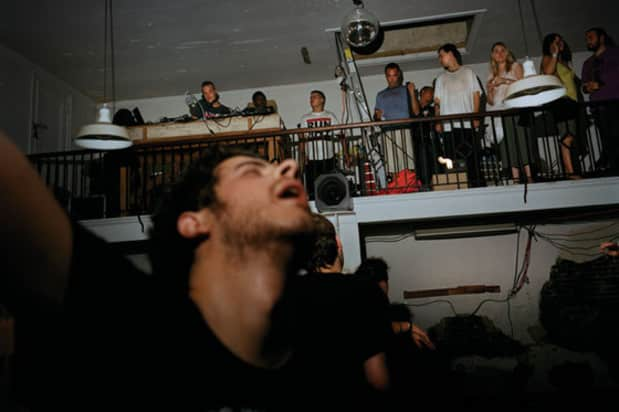Very few people outside of actual FADER staff have contributed as much, literally and figuratively, to our magazine and website as Philly-Floridian producer/impresario/globetrotter/DJ/good dude Diplo. From helping birth Hollertronix to penning stories for us to continually championing serious jams, he has given us a lot to listen to and think about. So, it made sense, when we decided to reprint our "New Club" feature from the FADER 50 Special Issue which largely revolves around him, that we'd ask Diplo to make a mix to accompany it. The mix we got, made with Mad Decent cohort Paul Devro is, unsurprisingly, not so much about what's already happened but what is going to happen next, and it is totally nuts. Make the jump for Nick Barat's feature "Last Night a Remix Saved My Life" from F50, and download the Mad Decent FADER Mix below.
Download: MAD DECENT FADER MIX (right click, save as)
Story Nick Barat
Photography John Francis Peters, Jason Nocito and Liz Johnson Artur
In the fall of 2002, two Philadelphia DJs—Low Budget, a local prodigy scratching his way through the city’s bars and lounges, and Diplo, a Florida transplant making dusted bedroom beats from flea market LPs—rented out a Ukrainian meeting hall so they could throw a monthly Saturday night party.
Originally called Get Krunk Now but quickly renamed Hollertronix after its first edition, it was more like a house party—or a particularly fucked up prom—than a club night, mostly because the Ukie wasn’t a club. You didn’t have to take off your hat or put on heels or wear a buttondown to get in, and there damn sure wasn’t a velvet rope. The Ukie was just a giant wood-paneled room that reeked of pheromones and spilled bottles of $3 Obolon beer. Low Budget and Diplo favored ’80s electro and ’90s favorites, then mixed them alongside the dirtiest, most up-to-the-minute regional dance music they could find on vinyl. The cold clomp of the Eurythmics’ “Sweet Dreams” was beatmatched with David Banner and Lil Flip’s “Bout Our Money,” a half-time banger built on Annie Lennox and Dave Stewart’s same keyboard line.
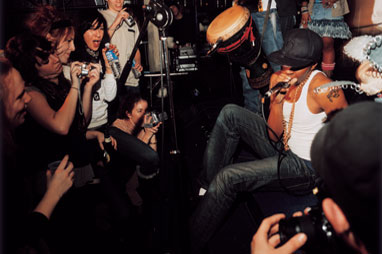
The timing was perfect. The phrase “mash up” had just launched a million magazine articles, popular hip-hop was shuffling towards a stagnant post-Puffy nadir (product placement! Nellyville!), indie disco was still trying to claw its way out from under crates of unplayed Fischerspooner 12-inches, and partygoers wanted an antidote. It also helped that an entire generation of kids raised on equal helpings of 120 Minutes and Rap City had just become old enough to drink.
The Philly boys were by no means the first genre-disregarding DJs to make a name for themselves, but they were the first to do it with a swagger that befitted a party rather than an art project or some stoner pause tape. In a Hollertronix set, styles weren’t smashed together as a post-modern joke, it was done because the DJs understood how well they could complement each other. And more importantly, they understood that people wanted to dance to the music, not discuss it. Every month, the Ukie had lines around the block. They even had to buy an air conditioner.
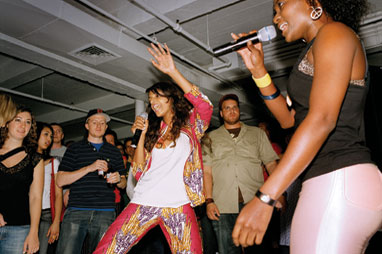
News of this oasis quickly spread beyond the Ben Franklin Bridge. A FADER scene piece on the Ukie parties featuring characteristic restraint (“Who’s fucking tonight? Me, motherfuckers!”) appeared right around the same time as Hollertronix’s frantic mix CD/mission statement, Never Scared. The collection showcased imported Björk remixes next to Baltimore club music and obscure Neptunes productions rescued from a West Philly dollar bin. New York Times critic Kelefa Sanneh named Never Scared one of the ten best albums—albums!—of the year, and before Low Budget and Diplo could even celebrate their party’s second anniversary, they found themselves getting paid handsomely to export Philadelphia sweat to the rest of the planet.
Most local-DJs-done-good success stories would end there, leaving our heroes to go through the motions and cash the checks that come along with it. What makes the Hollertronix tale different is that the upstarts didn’t get assimilated into mainstream nightlife. Instead, they reshaped the culture in their own wild-eyed image. I can’t help but be biased on this point—I designed the first Hollertronix website along with many of their early flyers and T-shirt graphics—but I knew they were on to something big before we were even officially introduced. While I danced myself stupid as girls played Nintendo Kung Fu on a projection screen at the Never Scared release party, a million-watt light bulb went off over my head and stayed there until the next morning when I went and bought a set of turntables, confident it was the best decision I had ever made.
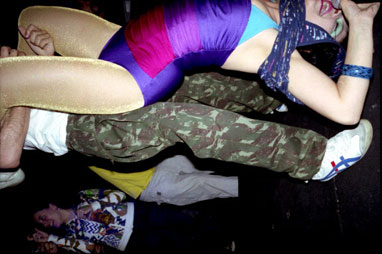
This wasn’t a unique epiphany. Hollertronix didn’t “tour” so much as set out on Johnny Appleseed bass crusades, and soon every US metropolis and college town they visited had its own multi-genre, DIY dance party; some DJs were even so brazen as to yoink the “-tronix” suffix for themselves. Eventually Diplo and Low B abandoned their tag team approach to concentrate on solo DJ careers and other adventures, but the Hollertronix influence continued to grow on its own, thanks to the advent of digital DJ programs like Serato, as well as the rapid rise of mp3 remix blogs and web hubs for like-minded selectors (including Low B’s own message board). The party became a sound, and the sound gave way to a scene, as cross country DJs swapped gigs with one another, greeted international producers like Radio Clit and Sinden with open arms on their first stateside jaunts, and provided a pre-built fanbase and touring route for international club labels like Ed Banger to tap into when coming to America. The total breakdown of genre boundaries re-energized established names like Stretch Armstrong and A-Trak; even DJ AM and other celebrity staples began dropping Baltimore remixes in bottle service clubs.
The scene claimed more than just DJs as its own. Long before London’s MIA made it to the cover of this magazine, “Galang” had already become a white label staple at the Ukie. Many of her earliest stateside performances took place on that same beer-soaked stage, performing to crowds who knew every word. Fellow FADER cover star Spank Rock got his first gigs opening those MIA shows, but even before that, you could catch him at the party, rockstar thin and fedora-ed, dancing dangerously close to the giant rented bassbins. Grinding up on him would be future cohort Amanda Blank, doing In Living Color fly girl moves at Mach 10 while wearing a baby doll dress and cowboy boots. Even the dirtballs cutting in line for the bathroom turned into critically acclaimed, literate spaz-rappers Plastic Little. And those are just the people in Philly! Bridges were built to every city. Parisian hip-hop weirdos TTC embraced their inner Lil Jons and brought their strange strain of le crunk to the world. The Brazilian college kids in Bonde do Role worked up the courage to email their cyborg creations of baile funk loops and grunge riffs to Diplo, and he founded his Mad Decent label on them.
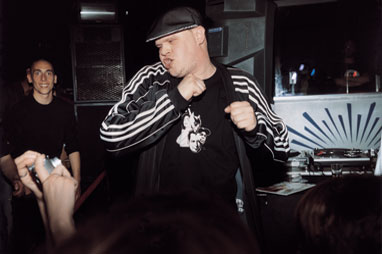
Recently I went back to Philly to see Diplo on his tour with UK dance producer Switch, and the opener was Baltimore-based Mad Decent artist Blaqstarr. On the drive down, I got a last-minute text message that the show had been moved from the original venue to Diplo’s new studio, an old mausoleum he had purchased a few months earlier and was in the process of converting. They brought in video projectors, giant speaker stacks, two kegs and a garbage can filled with ice cubes and Sparks. It was a welcome nostalgia trip back to those ad hoc, disaster-courting Ukie days, and the night was an encapsulation of the scene five years later: a hometown hero rocking with both a respected international artist and an exciting young dude from a region previously only known on vinyl, all while tons of kids lost their minds dancing until the sun rose over a building that had been paid in full with mash up money.
If it sounds like I’m romanticizing the recent past, it’s because I totally am. When I watch 24 Hour Party People and see the fictionalized version of the Happy Mondays being spawned from the pill-filled Hacienda only to conquer the UK with dance music, I think to myself, Oh shit, I know those dudes. I made friends on a dancefloor half the size of a middle school gym, and then those friends went on to rap for thousands of people off the strength of a DJ subculture. I am able to travel around the world playing records because two guys in Eagles fitteds showed how pointless it was to segregate parties into ’80s nights or indie nights or hip-hop nights. They reminded people it’s OK to want to hear some different shit—and if you can’t find it anywhere, make it yourself.
MIA, "Galang"
Bonde do Role Live at The FADER Fort, Austin, Texas, 2007
DJ Blaqstarr f. Rye Rye, "Shake it to the Ground"
Spank Rock Live at FADER 49 Party, New York City, 2007
TTC, "Telephone"
MP3: MAD DECENT FADER MIX
Tracklist:
Kid Cudi - Day & Night (Jokers of The Scene Remix) {Fool's Gold}
KW Griff - Phil Collins
Remi Nicole - Rock 'N' Roll (Lee Mortimer Remix)
Roundtable Knights - Freaks of Desire {Arcade Mode}
Nifty - Nifty {Atlantic Jaxx}
Jackie Chain - Blinded By The Light {Paper Route Records}
Diplo - I'm So Hood Dubplate
MC Creu - Danca Do Creu
MC Nemen - Come Queto
Katalina - DJ Girl
DJ Sega - Bodies Hit The Floor {Hollertronix}
Blaqstarr - My Smacked Bitch {Hollertronix}
DJ Sega - Dig {Hollertronix}
Trip - Who's That (Jack Beats Remix) {Ahead of The Game}
Kissy Sell Out - Harriet (Kissy's Special Annie Mac Edit feat. Bolt
Action Five)
Pomomofo - Back at the Club (Boy 8-Bits Emotional Hardcore Remix)
Alan Braxe & Fred Falke - Defender {Vulture}
Crookers - Purple Lens Game
Odyssey - Who {WWA}
